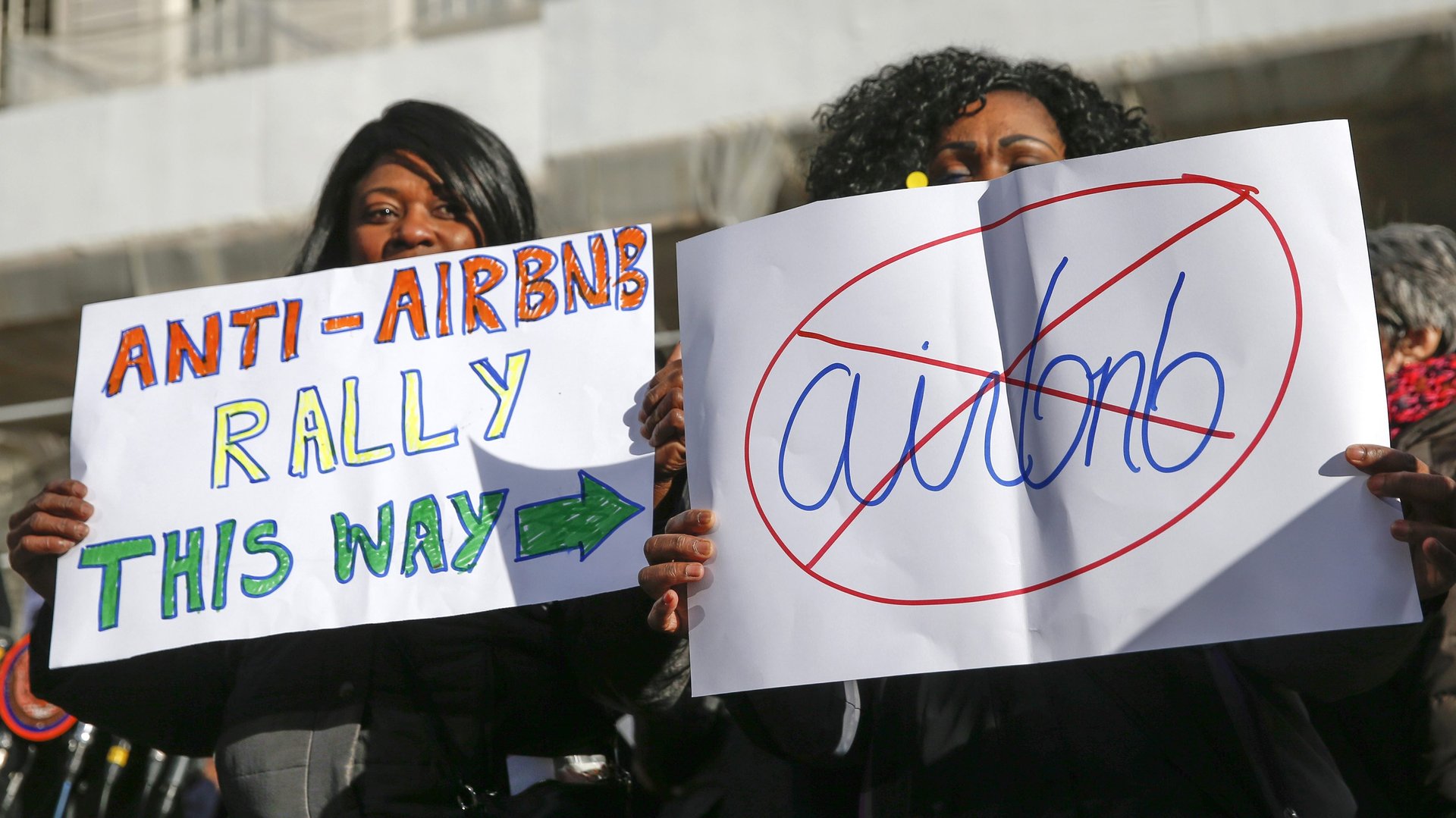The next 10 days will decide whether Airbnb lives or dies in New York City
The countdown has begun for Airbnb in New York City.


The countdown has begun for Airbnb in New York City.
This summer the New York state senate passed a bill that would make it illegal for residents of ”Class A” multiple dwellings in New York City—buildings designed for three or more families—to advertise their full home for rent for less than 30 days. Violators would be fined up to $1,000 for the first offense, $5,000 for the second, and $7,500 for the third. That bill was sent to governor Andrew Cuomo yesterday, who has until Oct. 29 to sign or veto it. If he takes no action, the bill becomes law. Cuomo hasn’t put forth a formal stance on the issue. Airbnb has threatened to sue the state if the law goes into effect.
The legislation, while written broadly, would be devastating for Airbnb, whose home-sharing business is premised on getting everyday people to list spare rooms for rent. New York City is one of Airbnb’s largest US markets with nearly 45,000 listings as of Aug. 1, according to company data, about half of which are “entire homes.” (Any residential unit, including a single apartment in a building, is considered an “entire home” by Airbnb.)
While rentals of less than 30 days are already illegal in the city under state law, regulators have struggled to enforce the rules without access to Airbnb’s database, and the company has done little to help them. The state senate bill is a workaround. Regulators don’t need to know when and where illegal rentals are happening if they are unlawful to advertise in the first place.
That the bill could become law has been a reality for Airbnb since June, but its progression to the governor’s desk has left the company scrambling. On Wednesday, Airbnb emailed its users asking them to call and tweet at the governor, and condemning the pending legislation as a “backroom deal” between legislators and the hotel industry that is “anti-tenant, anti-homeowner, anti-innovation.” Overnight, Airbnb also published a column in the New York Daily News that proposed a new set of rules on home-sharing.
Among other things, Airbnb says it would require all hosts in the state to register online and would limit hosts in the city’s five boroughs to renting a single home, something it also today said is in the works for San Francisco. Such rules are designed to deter property owners from operating so-called illegal hotels and protect the residential housing supply in cities where it is already strained. Airbnb said in September that 96% of its hosts in New York City who share an entire home only have one such listing.
Beyond that, Airbnb is offering to create a “dedicated 24/7 hotline” for neighbors, who have complained in the past that transient Airbnb guests make buildings unsafe or disturb the ”quiet enjoyment” of residential life. The company says it would implement a “three strikes” policy that bans hosts who repeatedly break the rules.
Airbnb, last valued by investors at $30 billion, has branded itself an “economic lifeline” for the middle class. As it shifts into full-blown crisis mode in New York, the company is amplifying that message. “It’s baffling to us that in this time of economic inequality, folks would be looking to impose fines as high as $7,500 on a middle-class person looking to use the home they live in to help make ends meet,” Chris Lehane, Airbnb’s global head of public policy, said on a call with reporters. “This is a classic people-versus-the-power moment for New York.”
Policymakers who back the senate bill are dismissing Airbnb’s efforts as a “PR stunt” and a “Hail Mary” to save its New York business. They say Airbnb did not approach them with its latest recommendations ahead of taking them to the press, and is only worried about its bottom line.
“Airbnb’s entire business model is predicated on breaking the law,” Linda Rosenthal, the assembly member who sponsored the bill, said in a conference this morning. “At the eleventh hour they’re desperate to change the narrative and we do not negotiate—in newspapers, in the press, and especially with the lawbreaker.”